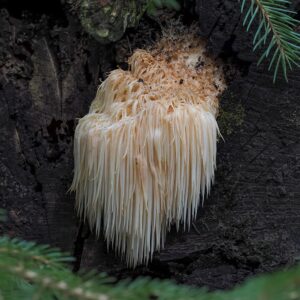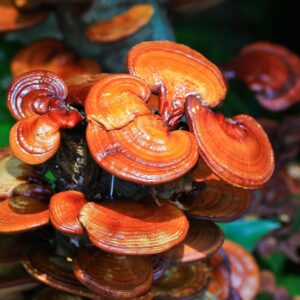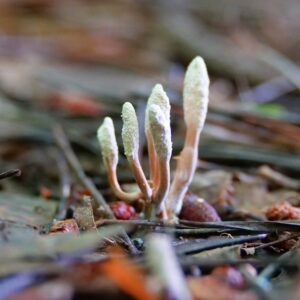If your mood plummets in the darker months of the year, winter depression could be the reason – welcome to the second part of this article! We talked about the psychological part in the previous article, but below you will find a small selection of superfoods that can be more than worth their weight in gold.
Because even if superfoods don’t solve all of life’s problems, they give us the strength and vitality we need to go through life with clarity and focus.
Some things are easier to carry with a well nourished body than before.
The sun vitamin
Of course we’re talking about vitamin D3 here, everbodys darling so to speak!
It is the feel-good factor par excellence; mild to severe depression can simply be caused by a vitamin D deficiency. 
In summer, we build up a store of vitamin D – the more light, the better!
But in the northern latitudes in particular, this is sometimes used up quickly, as the sun is simply not enough for the long, cold winter, and in winter we usually wait in vain for it.
As soon as the cold season approaches, many people notice a change in their mood.
This can sometimes be attributed to the first drop in vitamin D levels.
Incidentally, a deficiency can easily be detected by a blood test.
But beware!
Factors that need to be considered
Boron deficiency also often plays a role here, as the rare boron is urgently needed in the body to convert it into the active form of vitamin D and is contained in moringa leaves, for example.
The liver and kidneys are also involved in the conversion and may be the cause if the vitamin D level cannot be raised.
Finally, the form of vitamin D supplied also plays a role, as does the dose.
However, this is where opinions differ.
From the government’s point of view, high doses are not guaranteed to be safe in terms of possible side effects.
To avoid these, it is therefore important to take vitamin D in combination with vitamin K2, as vitamin D increases the absorption of calcium.
Vitamin K2 then ensures that it is stored at the intended target site, namely the bones and teeth, instead of in the worst case in vessels (arteriosclerosis), joints (arthritis) or in the kidneys (stone formation).
However, with the right preparation, it is not necessary to take extremely high doses of vitamin D, which is difficult to absorb and fat-soluble.
There is the option of taking it in liposomal form vitamin D (+K2).
In order to achieve the best possible absorption, liposomal vitamin D uses a little “trick”: phospholipids enclose the vitamin D and serve as a carrier.
As phospholipids are preferentially absorbed, the preparation works faster and better.
Other side effects of a vitamin D deficiency
In addition to a worsened mood, susceptibility to infections also increases, the strength of bones and teeth suffers and muscles are also weakened.
There are nocturnal calf cramps, which do not improve even with magnesium, muscle twitching, dizziness, visual disturbances, exhaustion, listlessness, pain in the back and neck, which gets worse at night and during exertion, nausea on exertion.
Vitamin D deficiency is also easily recognizable by spots and grooves on the fingernails, but this can also be related to zinc deficiency.
An increased susceptibility to sunburn and sun allergies are also typical.
Ergo: A defect is not to be trifled with – because this is about substance.
A viral low
We all know that vitamin D also reduces susceptibility to flu-like infections – and here it has a double preventative effect, so to speak.
This is because flu-like infections themselves can also be mentioned as a cause of the winter blues.
Coughs, colds and hoarseness are not really uncommon, especially in the cold season.
But does that make you despondent and depressed?
Yes, it is possible, because viral infections can trigger persistent low moods.
Anyone who feels weepy, uncared for and desperate during and after an infection, almost childishly helpless, certainly knows what we are talking about.
Viral infections even cause symptoms typical of depression, such as insomnia, headaches and melancholy.
The reason for this is that the psyche is influenced by the activities of the body’s own immune system!
The Freiburg University Medical Center discovered why this is the case: the nerve cells in the hippocampus are inhibited by a protein that controls viral defense.
This restricts their ability to provide feedback.
And what can I say – it is precisely this reduced adaptability of the nerve cells that is also found in the hippocampus in cases of depression.
Stress without end!
It is typical of the reduced adaptability of the hippocampus in depression and viral stress that the release of stress hormones cannot be stopped again after acute stress.
The hippocampus is often smaller in depressed people and they also have fewer stress-regulating receptors available, which can almost certainly be traced back to childhood trauma.
If security, trust and well-being cannot be built up in young children through closeness and care from their mother and/or traumatic experiences occur, fewer stress-regulating receptors are formed in the hippocampus, the activation of which would end the stress.
As no one has grown up in an exclusively perfect world and traumas are part of life, everyone is more or less at risk of experiencing depressive phases in their lives.
But don’t worry, there’s help in sight!
And it’s in Mother Nature’s pharmacy cupboard…
Adaptogens from nature
Adaptogens are natural hormone-like substances found in plants and fungi that help the body to deal with stress.
These adaptogens have the wonderful ability to promote the production of the body’s own happiness messengers and thus reduce or even stop the excessive release of stress – and they often also have an antiviral effect.
Yes, it is interesting that nature provides precisely the combined effects that humans need.
Below you will find a small selection.
Hericium medicinal mushroom regenerates the nerves
Hericium, also known as hedgehog’s beard, is a medicinal mushroom.
It rarely occurs t in our latitudes and if you were to discover one, you would probably remember it.
t in our latitudes and if you were to discover one, you would probably remember it.
This is because this mushroom has spines that hang down like hairs from a certain length.
In China, it is known as “yamabushitake”, or monkey head mushroom, and in France it is also known as “pom-pom blanc” (white pom-pom).
The medicinal mushroom has been the subject of a wide range of research for several years, because the mushroom strengthens the nervous system.
This is very interesting for people suffering from depression, but the effect on neurological degenerative diseases is also interesting.
Parkinson’s disease, for example, is one of the most common diseases of the nervous system – those affected suffer from muscle tremors, among other things.
The cause is the continuous death of dopamine-producing nerve cells (dopaminergic neurons) and the tragic thing is that the disease usually only becomes noticeable when more than 50% of these cells have already died.
The Hericum medicinal mushroom could provide a remedy here, at least according to Chinese researchers who published a study in March 2020 to prove that the Hericium medicinal mushroom can protect these dopaminergic neurons.
But that’s not all: the fungus is said to be able to regenerate damaged nerve tissue (1), as it has been shown to stimulate the production of nerve growth factors.
Nerve growth factor regulates and stimulates the growth, differentiation and survival of nerve cells.
It is usually reduced in depressed people.
Hericium also rebuilds the myelin layers of the nerves, so that the chance of finding help at all should be worth a try with Hericium for those affected.
By the way: All medicinal mushrooms have an antiviral effect, they all have no side effects and are not addictive!
Reishi medicinal mushroom supports the liver
In China and Japan, this medicinal mushroom has been highly valued for thousands of years and is still regarded as a symbol of happiness and immortality.
According to traditional Chinese medicine, this mushroom tends to be used for people who are struggling with a low mood due to frustration, suppressed anger and aggression.
This is because these emotions put a strain on a specific organ: the liver.
According to traditional Chinese medicine, accumulated energy in the liver meridian is a main trigger for depression, as the liver is the seat of the Hun soul, i.e. the subconscious.
Between 1 a.m. and 3 a.m., this causes us problems, as this is the liver’s main time and we suffer from restless sleep, insomnia and nightmares.
However, the effect on the liver and the very diverse application possibilities are not only the subject of TCM, the Reishi medicinal mushroom is now one of the best-studied medicinal mushrooms in the world and is now listed in the PubMed study database with well over 1000 studies.
The natural ingredients help to strengthen and protect the liver.
From a study with hepatitis patients showed that reishi appears to be particularly helpful in cases where the liver was not yet too severely damaged.
In the Chinese study, 355 hepatitis B patients were treated with the so-called Wulingdan pill, which is mainly made from the fruiting body of reishi: In around 92 percent of the test subjects, the previously poor liver values improved considerably.
Specific polysaccharides and triterpenes from the large family of secondary plant substances appear to be the main active ingredients of the mushroom.
Reishi contains more than 100 different highly effective polysaccharides, which can even be recommended as a preventive measure against influenza or other viral diseases due to their enormous anti-viral effect.
These polysaccharides stabilize the human immune system.
The triterpenes protect the reishi itself, for example from infestation by microorganisms.
In our body they have a strong antibacterial, calming and anti-inflammatory effect.
Around 140 highly active triterpenes have been found in reishi.
Cordyceps medicinal mushroom
The Cordyceps medicinal mushroom originally comes from Tibet.
What is interesting for us is that it strengthens the kidneys, because in Chinese medicine kidney energy stands for anxiety, depression, a strong sense of emptiness and a lack of zest for life.
Studies show that cordyceps regulates the release of hormones from the adrenal cortex, especially adrenaline, which makes it easier to cope with stress overall.
Stress causes people to age earlier than necessary, which is linked to the overloading of the adrenal glands connected to the kidneys.
The mushroom has also been shown to inhibit the enzyme monoamine oxidase (MAO), which breaks down serotonin, noradrenaline and dopamine, our so-called feel-good substances.
The mushroom therefore acts like certain anti-depressants and can counteract mood swings.
It also contains the amino acid L-tryptophan, from which the body can produce the feel-good hormone serotonin itself, and balances thyroid activity, which also has an effect on the psyche.
There really is an incredible amount to say about medicinal mushrooms, and the information you have read here is of course just the beginning.
If you would like to find out more, you should buy a book (e.g. Healing Mushrooms: The Most Important Species in the World. Description – Ingredients – Effects by Jürgen Guthmann).
Star anise and rhododendron can also be mentioned as adaptogens.
Below are some isolated but no less valuable active ingredients.
Tryptophan – Old but gold
Tryptophan can of course also be taken in isolation and I would argue that it is the all-time bestseller and probably the best-known natural depressant.
But rightly so!
A deficiency is immediately noticeable as a low mood, if it persists, the result is resulting in depression.
Anxiety disorders can also be triggered by tryptophan deficiency.
The thing about tryptophan is very simple and effective.
It is the precursor for the aforementioned serotonin.
And melatonin is made from serotonin.
Poor sleep is stressful and stress is the main cause of tryptophan deficiency.
So we have uncovered a nice vicious circle.
Incidentally, stress mainly affects our vitamin B and magnesium levels.
It is therefore only logical to take a vitamin B complex and a good magnesium supplement if you have a trypopha deficiency.
The amino acid lysine
Lysine is an essential amino acid that is needed in the body to build muscle and other amino acids.
Because of its L-shaped appearance, it is actually called L-lysine, but in everyday use it is just called lysine.
The amino acid contributes to the formation of enzymes, hormones and antibodies and also supports bone growth, cell division and wound healing.
Lysine cannot be produced by the body on its own and must therefore be taken in through food or supplements – as the Western diet is not necessarily the most varied, lysine is particularly important.
L-lysine reduces susceptibility to stress and has a strong effect on the psyche, as it balances the stress hormones cortisol and adrenaline.
It can therefore reduce anxiety, panic attacks, obsessive-compulsive disorder, phobias, post-traumatic stress disorder and depression – it eases the mind, which suggests its use in depressive moods.
Lysine raises serotonin levels and prolongs the serotonin effect in the nerve cells of the brain, thus having an antidepressant effect.

Microalgae oil
Microalgae oil is the vegan alternative to krill oil.
It improves brain metabolism and all the processes that take place there, including energy supply and the dopamine and serotonin levels that are so important for mood and drive.
Antidepressants are often superfluous or work incomparably better when taken together with microalgae oil.
Conclusion:
As fantastic as all this may sound, unfortunately we do not have a miracle cure at hand.
And of course we can’t claim that the active ingredients mentioned can heal big and small just like that.
Anyone who claims that what they advertise is the panacea for all wounds and physical ailments is not even a good salesman.
Because anyone who has studied the subject of health or being human in general knows how incredibly different, versatile and treacherous the human body can be.
Not everyone is the same, there are so many factors that can influence how something works and whether it works at all.
But experience has shown that a healthy diet and the substitution of appropriate natural substances are a game changer and, together with a lot of honesty and mental work, can open up a whole new path.
What is of course important, but often difficult, especially for depressed people, is a continuous intake.
Before you judge whether something is helping you or not, take it at the right dose for at least 3-4 weeks.
With this in mind, I wish you every success.
